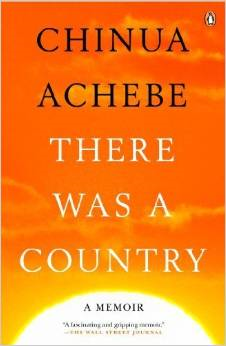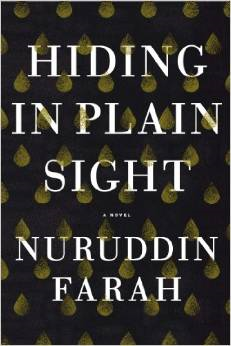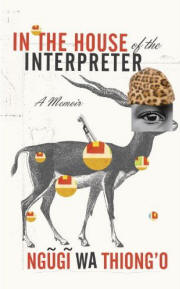GLORIA’S NEW LIBRARY PICKS
All of these selections are new acquisitions at the Toronto Public Library and also available through Amazon.
Achebe, Chinua. There was a country: a personal history of Biafra. NY.:Penguin Press, 2012
“Achebe masterfully relates his experience, both as he lived it and how he has come to understand it. He begins his story with Nigeria’s birth pangs and the story of his own upbringing as a man and as a writer so that we might come to understand the country’s promise, which turned to horror when the hot winds of hatred began to stir. To read There Was a Country is to be powerfully reminded that artists have a particular obligation, especially during a time of war. All writers, Achebe argues, should be committed writers—they should speak for their history, their beliefs, and their people.” From Amazon.com
Binyavanga Wainaina. One day I will write about this place. Minneapolis, Minn: Graywolf Press, 2011.
“In this vivid and compelling debut, Wainaina takes us through his school days, his failed attempt to study in South Africa, a moving family reunion in Uganda, and his travels around Kenya.The landscape in front of him always claims his main attention, but he also evokes the shifting political scene that unsettles his views on family, tribe, and nationhood. Throughout, reading is his refuge and his solace. And when, in 2002, a writing prize comes through, the door is opened for him to pursue the career that perhaps had been beckoning all along. Resolutely avoiding stereotype and cliche, Wainaina paints every scene in One Day I Will Write About This Place with a highly distinctive and hugely memorable brush.” From Amazon.com
Farah, Nuruddin. Hiding in plain sight. Penguin Group (USA) Incorporated 2014.
“When Bella learns of the murder of her beloved half brother by political extremists in Mogadiscio, she’s in Rome. The two had different fathers but shared a Somali mother, from whom Bella’s inherited her freewheeling ways. An internationally known fashion photographer, dazzling but aloof, she comes and goes as she pleases, juggling three lovers. But with her teenage niece and nephew effectively orphaned – their mother abandoned them years ago—she feels an unfamiliar surge of protective feeling. Putting her life on hold, she journeys to Nairobi, where the two are in boarding school, uncertain whether she can—or must—come to their rescue. When their mother resurfaces, reasserting her maternal rights and bringing with her a gale of chaos and confusion that mirror the deepening political instability in the region, Bella has to decide how far she will go to obey the call of sisterly responsibility.
Fuller, Alexandra. Cocktail hour under the tree of forgetfulness. TO: Random House Canada, 2011
Alexandra Fuller braids a multilayered narrative around the perfectly-lit-Happy Valley-era Africa of her mother’s childhood; the boiled cabbage grimness of her father’s English childhood; and the darker, civil war-torn Africa of her own childhood. A story of survival and madness, love and war, loyalty and forgiveness, this intimate exploration of Fuller’s family — at its heart,the story of her mother, Nicola — is as funny, terrifying, exotic, and unselfconscious as Nicola herself.” From Amazon.com
Jamal, Tasneem. Where the air is sweet. Harper Collins, 2014
“An epic saga that charts three generations of an Indian family in Uganda
In 1972, dictator Idi Amin expelled 80,000 South Asians from Uganda. Though many had lived in East Africa for generations, they were given ninety days to flee as their country descended into a surreal vortex of chaos and murder.
Spanning the years between 1921 and 1975, Where the Air Is Sweet tells the story of Raju, a young Indian man drawn to Africa by the human impulse to seek a better life, and the two generations that follow him and carve a niche for themselves in a racially stratified colonial and post-colonial society. This is the story of a family: their loves, their griefs and their sudden expulsion by one of the world’s most terrifying tyrants.” From Amazon.com
Ngugi was Thiongo. In the house of the interpreter: a memoir 1955- 1959. NY.:Pantheon Bks, 2012
“In the House of the Interpreter richly and poignantly evokes the author’s life and times at boarding school—the first secondary educational institution in British-ruled Kenya—in the 1950s, against the backdrop of the tumultuous Mau Mau Uprising for independence and Kenyan sovereignty. While Ng˜ug˜ý has been enjoying scouting trips, chess tournaments, and reading about the fictional RAF pilot adventurer Biggles at the prestigious Alliance High School near Nairobi, things have been changing rapidly at home. Poised as he is between two worlds, Ng˜ug˜ý returns home for his first visit since starting school to find his house razed and the entire village moved up the road, closer to a guard checkpoint. Later, his brother Good Wallace, a member of the insurgency, is captured by the British and taken to a concentration camp. As for Ng˜ug˜ý himself, he falls victim to the forces of colonialism in the person of a police officer encountered on a bus journey, and he is thrown into jail for six days. In his second year at Alliance High School, the boarding school that was his haven in a heartless world is shattered by investigations, charges of disloyalty, and the politics of civil unrest.” From Amazon.com
Olopade, Dayo. The bright continent: breaking rules and making change in modern Africa. Boston: Houghton Mifflin Harcourt,2014
“Dayo Olopade knew from personal experience that Western news reports on conflict, disease, and poverty often leave out the true story about modern Africa. And so she crossed sub-Saharan Africa to document how ordinary people deal with their daily challenges. She found what cable news ignores: an innovative continent of DIY changemakers and impassioned community leaders, driven by kanju — the specific creativity born of African difficulty. It’s a trait found in innovators like Kenneth Nnebue, who turned cheap, VHS tapes into the multimillion-dollar film industry Nollywood. Or Ushahidi, a technology collective that crowdsources citizen activism and disaster relief. A shining counterpoint to the conventional wisdom, The Bright Continent celebrates the tools Africans use to solve problems themselves. Their ability to do more with less is a powerful model for the rest of the world.” From Amazon.com
Reybrouck, David van. Congo: the epic history of a people. New York, NY: Ecco/Harper Collins, 2014.
“Van Reybrouck takes us through several hundred years of history, bringing some of the most dramatic episodes in Congolese history. Here are the people and events that have impinged the Congo’s development—from the slave trade to the ivory and rubber booms; from the arrival of Henry Morton Stanley to the tragic regime of King Leopold II; from global indignation to Belgian colonialism; from the struggle for independence to Mobutu’s brutal rule; and from the world famous Rumble in the Jungle to the civil war over natural resources that began in 1996 and still rages today.” From Amazon.com








